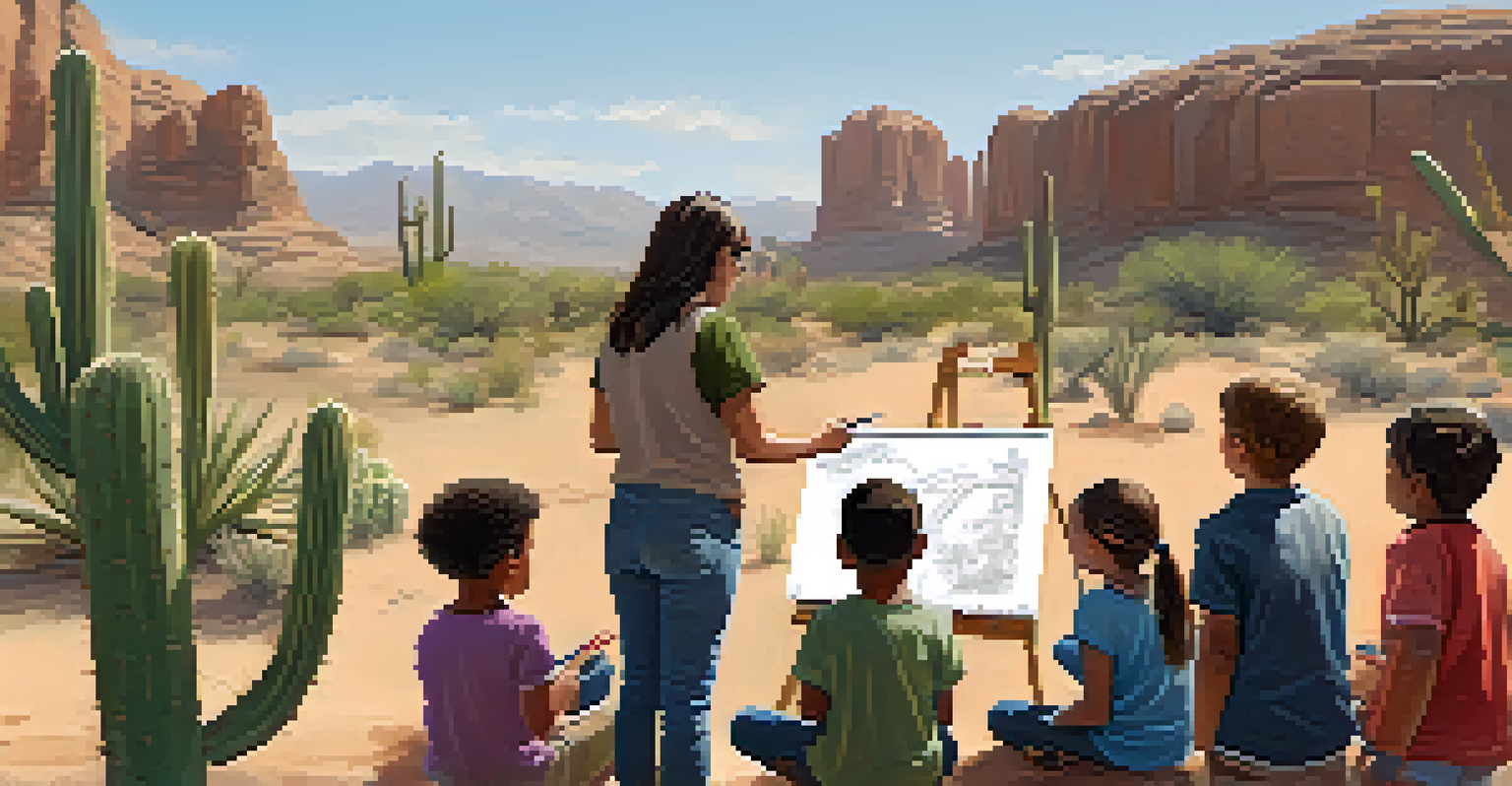Volunteer Opportunities in Tucson's Environmental Education

Understanding Environmental Education in Tucson
Environmental education in Tucson aims to foster a deeper understanding of our natural surroundings. It encompasses various topics, including ecology, conservation, and sustainability. By engaging with local ecosystems, volunteers help promote awareness and appreciation for the region's unique biodiversity.
The environment is where we all meet; where we all have a mutual interest; it is the one thing all of us share.
Organizations across Tucson work to deliver educational programs that connect people with the environment. These initiatives often involve hands-on activities, workshops, and community events. Volunteers play a crucial role in facilitating these experiences, making learning accessible and enjoyable.
Whether you’re a student, a retiree, or anyone in between, there are volunteer opportunities available that cater to your interests and skills. Engaging in environmental education not only enriches your own knowledge but also empowers others to take action for a greener future.
Volunteer Roles in Environmental Education Programs
Volunteering in environmental education can take on many forms, from leading nature walks to assisting in classroom settings. Many organizations seek volunteers to help with curriculum development, field trips, or community outreach efforts. Each role contributes to creating a more informed and environmentally conscious community.

For example, if you have a knack for storytelling, you might lead engaging nature programs for children. Alternatively, if you enjoy hands-on work, you could assist with habitat restoration projects. This variety ensures that there's a role for everyone, regardless of experience or expertise.
Engage with Tucson’s Ecosystems
Environmental education in Tucson promotes awareness and appreciation of local biodiversity through hands-on experiences and community involvement.
Additionally, these volunteer roles provide an opportunity to learn from environmental professionals. You might find yourself collaborating with biologists, educators, and conservationists, gaining insights that can enhance your own understanding of environmental issues.
Key Organizations Offering Volunteer Opportunities
Several organizations in Tucson are dedicated to environmental education and actively seek volunteers. Notable among them is the Arizona-Sonora Desert Museum, which offers programs that educate visitors about desert ecosystems. Volunteers here can assist with tours, educational workshops, and special events.
Volunteers do not necessarily have the time; they just have the heart.
Another great option is the Tucson Audubon Society, which focuses on bird conservation and education. They often need volunteers for community science projects, workshops, and outreach events. By joining their team, you can help promote birdwatching and foster appreciation for local wildlife.
Lastly, consider the Pima County Natural Resources, Parks and Recreation. They offer numerous volunteer opportunities related to habitat restoration, park clean-ups, and educational events. Each of these organizations contributes significantly to environmental education in the community.
Benefits of Volunteering in Environmental Education
Volunteering in environmental education has numerous benefits, not just for the community, but for the volunteers themselves. Engaging with nature and teaching others can lead to a greater appreciation for the environment. This connection often inspires volunteers to adopt more sustainable practices in their own lives.
Additionally, volunteering provides a fantastic opportunity to meet like-minded individuals who share your passion for the environment. You’ll likely form lasting friendships and connections that extend beyond your volunteer experience. These relationships can enhance your sense of belonging within the community.
Volunteer Roles for Everyone
There are diverse volunteer opportunities in environmental education, allowing individuals to contribute based on their interests and skills.
Moreover, volunteering can also serve as a valuable addition to your resume. Whether you’re looking to gain experience in education, conservation, or non-profit work, these opportunities can help you develop skills that are attractive to future employers.
How to Get Started with Volunteering
Getting started with volunteering in Tucson's environmental education is easier than you might think. Begin by researching local organizations that align with your interests. Most organizations have dedicated webpages outlining their volunteer programs and how to apply.
Once you've identified a few potential opportunities, reach out to the organizations directly. Many will have orientation sessions or informational meetings where you can learn more about their programs and how you can help. Don’t hesitate to ask questions to find the right fit for you.
Finally, be open to different experiences. Sometimes, the best opportunities come from stepping outside your comfort zone. Whether you’re leading a workshop or participating in a clean-up, every effort contributes to the greater goal of environmental education.
Overcoming Common Misconceptions About Volunteering
Many people hold misconceptions about volunteering, thinking it requires a significant time commitment or specialized skills. In reality, most organizations have flexible options that can accommodate busy schedules. Even a few hours a month can make a meaningful impact in Tucson's environmental education efforts.
Another common myth is that volunteering only benefits the recipients. In truth, volunteers often gain just as much from the experience, including new knowledge, skills, and friendships. Engaging in these programs can lead to personal growth and a deeper understanding of environmental issues.
Personal Growth Through Volunteering
Volunteering not only benefits the community but also enriches the volunteers' lives by fostering new friendships and enhancing their understanding of environmental issues.
Lastly, some may fear that they won't be able to contribute effectively. Remember, every small effort counts, and organizations welcome volunteers of all backgrounds. Your unique perspective and enthusiasm can be just as valuable as technical expertise.
Success Stories from Tucson's Environmental Volunteers
There are countless success stories from volunteers who have made a significant impact through environmental education in Tucson. For instance, a local volunteer at the Arizona-Sonora Desert Museum helped develop a children's program that has now reached thousands of students. Her passion for teaching and love for the desert environment inspired many young minds.
Another inspiring example comes from a group of volunteers at Tucson Audubon Society. They initiated a community science project focused on local bird populations, which has not only educated participants but also contributed valuable data for conservation efforts. This kind of grassroots engagement can lead to meaningful changes in the community.

These stories highlight how individual contributions can lead to collective success. Volunteers not only enrich their own lives but also help create a ripple effect of awareness and action in the community.